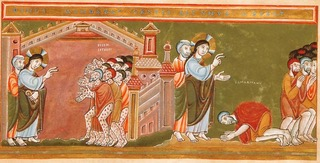Sunday Reflection with Canon Robin Gibbons: October 12th 2015

Codex Aureus Cleansing of the ten lepers.
Twenty-eighth Sunday in Ordinary Time
October 12th 2025
Pope Leo's Apostolic Exhortation Dilexi te has much to encourage and challenge us as we follow the Christ on the gospel road, but particularly by making it abundantly clear that our vocation is to reach out to the poor and needy, to accompany them, minister to them and treat them with dignity and love as our sisters and brothers and valuable members of the Kingdom of God. So when thinking of Namaan who even though he was a Syrian army commander suffered a form of leprosy and in our gospel of the ten lepers whom Jesus healed, I found this particular section Pope Leo wrote, shines a light on the way we ourselves need to face the forgotten lepers in our society: "Christian holiness often flourishes in the most forgotten and wounded places of humanity. The poorest of the poor - those who lack not only material goods but also a voice and the recognition of their dignity - have a special place in God's heart. They are the beloved of the Gospel, the heirs to the Kingdom (cf. Lk 6:20). It is in them that Christ continues to suffer and rise again. It is in them that the Church rediscovers her call to show her most authentic self". (Dilexi te 76)
Before antibiotics and medical advances leprosy was a ravaging and horrible disease made worse by being cut off from all that once the leper held dear. We forget that not only was it physically and mentally unpleasant in the extreme for the sufferers, but in terms of affective human relationships it meant total exclusion from society, living concealed by distinctive garments, marked out as an outcast, unable to work, dependent on the good will and generosity of others- which wasn't notable except for those who took it upon themselves to fulfil Christ's commandment to serve the sick.
An echo of how terrible it was is seen in the profound gratitude of Naaman, the Syrian Commander who had leprosy and who when washed clean in the Jordan at Elisha's command and was healed he is more than grateful. He realises life has been completely restored back to him, and so thankful for a new start he has what we can describe as a conversion of heart and soul and turns to the Lord whom Elisha worships, recognising the one true God. When the prophet refuses his gifts because it was not Elisha, but the Lord who performed this healing, Namaan asks for earth that will be used to create a sacred space for him to worship the Lord, a little piece of the promised land so to speak where he met the Lord in healing. The question here is what do we do when the Lord heals us from the blemishes of our lives? Are we grateful, thankful, and desiring of closer connections with the Holy One?
The gospel might push our thoughts on this question a little harder. Ten lepers ask Jesus to heal them and following his admonition to do as the Law requires (so that they can re-enter society) that is show themselves to the priests, find that on the way they are healed. It seems that nine of them carried on to fulfil the religious requirement of healing, but one, a Samaritan turns back to thank Jesus.. Are these nine ungrateful? The quick answer is we just don't know, presumably they were and as Jews would have offered gifts in thanksgiving, but what the Samaritan understands- presumably because he is outside the religious structures and not constrained by the Law, is that it is Jesus who has healed him. Jesus points out that it is his faith that has done this and gives him that greater cleansing, of forgiveness from his sins. We can overplay the nine lepers, suggesting they were less than grateful but there is no evidence for that , the only thing we need to know is that the Samaritan, one outside Jesus' faith was healed and gave glory to God. So here the question is, are we prepared to let God show us the wideness of mercy through others? To remind us that it is often through those outside our faith experience, and yes the outcast, the poor, the sick and the different ones are where we will see the face of the Lord Jesus. And above all else to have hope, for even if we appear to fail, this is always true of Christ:
"If we are unfaithful
he remains faithful,
for he cannot deny himself."(2 Tim 2:13)
Lectio
The Leprosy Mission Prayer
Almighty Father, the giver of life and health, look mercifully on those who suffer from leprosy. Stretch out your hand to touch and heal them as Jesus did during his earthly life. Grant wisdom and insight to those who are seeking the prevention and cure of the disease; give skill and sympathy to those who minister to the patients; reunite the separated with their families and friends; and inspire your people with the task set before The Leprosy Mission, that it may never lack either the staff or the means to carry on its healing work, in accordance with your will, and to the glory of your holy name. We ask this for the sake of Jesus Christ your Son, our Lord. Amen.
Apostolic Exhortation of Pope Leo XIV
Dilexi te
119. Our love and our deepest convictions need to be continually cultivated, and we do so through our concrete actions. Remaining in the realm of ideas and theories, while failing to give them expression through frequent and practical acts of charity, will eventually cause even our most cherished hopes and aspirations to weaken and fade away. For this very reason, we Christians must not abandon almsgiving. It can be done in different ways, and surely more effectively, but it must continue to be done. It is always better at least to do something rather than nothing. Whatever form it may take, almsgiving will touch and soften our hardened hearts. It will not solve the problem of world poverty, yet it must still be carried out, with intelligence, diligence and social responsibility. For our part, we need to give alms as a way of reaching out and touching the suffering flesh of the poor.
120. Christian love breaks down every barrier, brings close those who were distant, unites strangers, and reconciles enemies. It spans chasms that are humanly impossible to bridge, and it penetrates to the most hidden crevices of society. By its very nature, Christian love is prophetic: it works miracles and knows no limits. It makes what was apparently impossible happen. Love is above all a way of looking at life and a way of living it. A Church that sets no limits to love, that knows no enemies to fight but only men and women to love, is the Church that the world needs today.
121. Through your work, your efforts to change unjust social structures or your simple, heartfelt gesture of closeness and support, the poor will come to realize that Jesus' words are addressed personally to each of them: "I have loved you" (Rev 3:9).


















